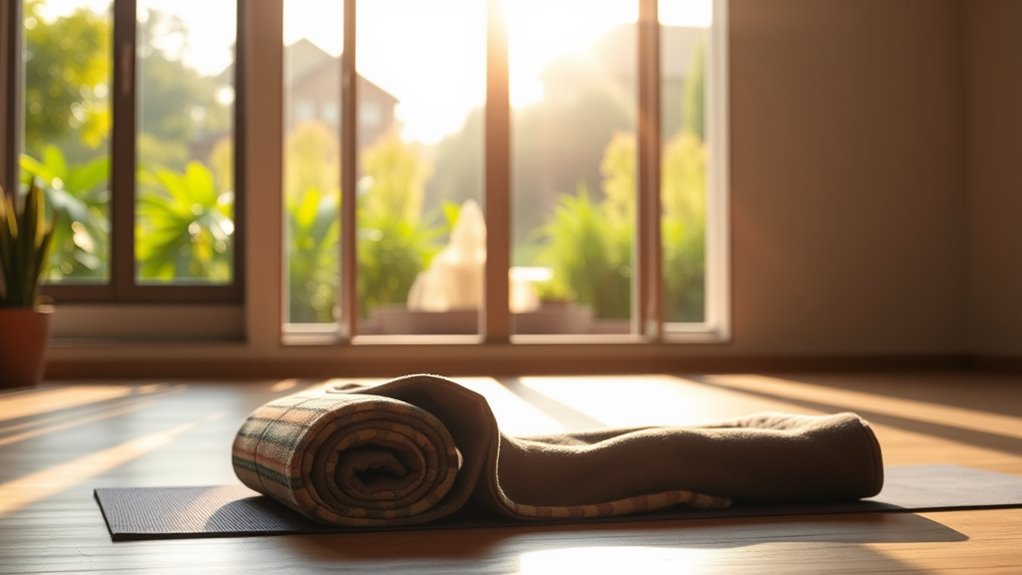
Release the power of stress relief with five effective exercises. Try aerobic workouts like running or kickboxing to reduce adrenaline and cortisol while boosting endorphins. Mind-body practices such as yoga and Tai Chi combine movement and deep breathing to enhance tranquility. Incorporate strength training to build resilience and elevate your mood through endorphin release. Mindful walking connects you with nature, lowering blood pressure and improving well-being. Relaxation techniques, including deep breathing and guided imagery, cultivate emotional balance. These activities offer more than just a stress escape—you’ll find they’re gateways to a more balanced life and greater mental well-being.
Aerobic Workouts
Engage in aerobic workouts as a proven method to manage stress effectively. Discover freedom in movement by lacing up your running shoes and embracing the open road. Running benefits your heart, lifting your mood and burning away stress alongside calories. Regular aerobic exercise promotes heart, lung, and circulatory system health, aiding in overall well-being. Incorporate regular walking to enjoy its joint benefits as you manage your stress levels. If pounding the pavement isn’t your style, consider the liberating energy of kickboxing. The intensity of cardio-kickboxing not only builds strength and endurance but also hones reflexes while melting away anxiety. Each punch and kick releases tension, providing a dynamic way to combat stress.
Prefer a low-impact option? An elliptical workout offers the same cardiovascular boost without the wear on your joints, allowing you to glide freely toward enhanced energy and reduced anxiety.
Regardless of your choice, aerobic workouts flood your system with endorphins, those little mood elevators that liberate you from the confines of stress.
Embark on this energetic journey two to three times a week, either through running or grabbing a kickboxing mat for sixty minutes of pure intensity. Whichever path you take, remember hydration and proper gear are key for safety, empowering you to dive deeper into liberation through movement.
Absorb the benefits and let go of what weighs you down.
Mind-Body Practices
Harnessing the synergy between mind and body offers a holistic approach to stress management. You can tap into profound mindfulness techniques like Mindfulness-Based Stress Reduction (MBSR) to anchor your thoughts and reduce anxiety. These practices empower you to concentrate on specific objects or sensations, creating a serene mental space that dims stress’s grip.
Meditation benefits extend to lowering blood pressure and reducing cortisol levels, fostering a state of calm and control over your emotional landscape. A 2017 review highlights that meditation techniques reduce blood pressure and cortisol levels, while also improving perceived stress, anxiety, depression, and anger, which collectively enhance sleep quality. Incorporating progressive muscle relaxation into your routine can further alleviate stress by managing muscle tension and promoting mental clarity.
Delve deeper with breathwork, rooted in ancient yoga traditions, where you can practice techniques like the 4-7-8 breathing method. It slows mental turbulence by activating the parasympathetic nervous system, enhancing relaxation and releasing feel-good hormones like serotonin and dopamine.
You can envision serenity with guided imagery, visualizing tranquil scenarios that transport you to peaceful mental dimensions.
Mind-body practices such as yoga, Tai Chi, and Qigong integrate movement with mental clarity. The flowing postures and deliberate breathing engage you physically, while quieting the mind.
Imagining each movement cultivates intrinsic energy and dissolves tension, rejuvenating your spirit. These methods offer you a pathway to liberation from stress, embracing full-body awareness and inner peace.
Strength Training

While mind-body practices offer peace and calm, strength training provides a powerful way to enhance both physical and mental resilience against stress. Engaging in regular strength workouts strengthens your muscles and builds up your defenses against life’s challenges. You’ll find that as your physical endurance grows, your mental toughness does too. Feel the rush of endorphins uplifting your mood and reducing anxiety as you push through those last few reps. It’s this powerful chemical release that makes strength training both a stress-buster and a mood elevator. Strength training also acts as a mental break, similar to meditation, as it allows focused physical activity.
To keep your workout motivation high, remember that even a compact 20-minute routine twice a week can notably lower stress levels by about 20%. Incorporating weight lifting 2-3 times a week supports muscle recovery, becoming essential to repair and grow stronger with each session, reducing muscle tension and enhancing your posture. This translates to better sleep and lower stress hormones like cortisol. Strength training isn’t just about sculpting your body; it’s your go-to “me-time,” a release from daily pressures that empowers you with each lift, squat, or press.
And with basic exercises or bodyweight routines, it’s accessible to everyone, helping liberate you from the chains of stress.
Mindful Walking
When stress feels overwhelming, incorporating mindful walking into your routine can offer a peaceful escape and numerous health benefits. By connecting with nature and focusing on breath awareness, you’ll experience a reduction in both blood pressure and heart rate.
Picture the soothing rhythm of your steps while the world around you breathes in harmony. This exercise isn’t just tranquil; it enhances your immune system, especially when you embrace the natural environment. Mindful walking encourages presence in the moment, fostering a deeper sense of alignment with your thoughts and emotions.
Mindful walking also greatly boosts your mental wellbeing. It’s proven to reduce stress, anxiety, and depression, offering a notable lift in mood. As you walk at a slower pace, pay attention to each footfall and the air moving through your lungs. The practice of mindful walking aligns with significant mood enhancement benefits seen with other physical exercises, as it triggers endorphin production and fosters positive emotional experiences.
Feel the weight of stress release with every step forward, inviting mental clarity and emotional balance into your day.
This practice fits seamlessly into your lifestyle, whether in the heart of a forest or amidst bustling city streets. Even short sessions improve your focus and concentration, assisting with conditions like ADHD.
Integrating mindful walking increases your daily step count, enhancing cardiovascular function, and aiding in weight management. Start today, and reclaim your mental peace and physical health.
Relaxation Techniques

As you stride confidently towards stress management through mindful walking, explore the next powerful ally in the journey: relaxation techniques. These methods provide a gateway to liberation from stress’s grasp.
Start with deep breathing exercises to calm both mind and body. Simply find a comfortable position, inhale through the nose for four counts, hold, and exhale through the mouth for six. You might prefer the 4-7-8 approach. Either way, consistent practice lowers stress and sharpens mental clarity. Regular practice of deep breathing exercises has been shown to significantly reduce anxiety and promote relaxation.
Progressive muscle relaxation allows you to become attuned to physical sensations, gravitating towards tranquility. Begin at your feet, working upwards, tensing each muscle group for five seconds, followed by a serene release for thirty. Integrate this with deep breathing for enhanced results.
Immerse yourself in guided imagery, using your imagination to conjure peaceful scenes with vivid sensory details. Retreat to a calm space and embrace this mental escape to shift focus away from life’s pressures. Herbal rituals, like sipping tea, offer a soothing complement to these techniques by incorporating calming bioactive ingredients that aid in reducing stress.
- Yoga: Pairs poses and breathing for relaxation.
- Tai Chi: Mixes slow movements with deep breathing.
- Autogenic Training: Enhances stress reduction through body awareness.
- Biofeedback: Uses tech to control stress responses.
Each technique edges you closer to stress mastery, guiding you toward freedom.
End With Calming Routines
Wrapping up the discussion of effective exercises for stress management, it’s evident that dedicating time to intentional, structured routines can notably impact one’s mental and physical well-being.
Deep breathing exercises serve as a foundational element, allowing individuals to anchor themselves and establish a baseline of calmness through controlled, rhythmic breathing. This paired with progressive muscle relaxation offers a detailed body-and-mind relaxation system, as you progressively work through muscle groups, tightening and then releasing tension, which can create a profound sense of release.
Both approaches can be performed almost anywhere, making them accessible tools for immediate stress relief and a deeper sense of calm. Regular aerobic activity, such as walking or jogging, reduces stress hormones like adrenaline and cortisol, further enhancing the stress-relieving effects of these exercises.
Transitioning into more dynamic forms of mind-body practices, disciplines like yoga and Tai Chi emerge as extensive exercises that not only engage the body but also nurture mindfulness and holistic health.
These practices effectively blend movement with breath work and meditation, promoting a balanced state that aids in reducing stress, anxiety, and depression.
Completing these exercises with calming routines such as mindful walking, gentle stretching, or even guided imagery magnifies their benefits, ensuring that the body can recover and rejuvenate.













